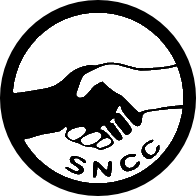
Raleigh, North Carolina
April 15-18, 2010
Presently we're in Feb. 2017 which will make this the 57th anniversary of SNCC and I have made some adjustments and added a few things to this post.
Freedom Riders
John Lewis describes his experience on the Freedom Rides
Lunch Counter Sit-ins
RealAudio
- John Lewis describes his experience on the Freedom Rides
- Julian Bond talks about the formation of SNCC
- Bob Moses describes the Greenwood Voter Registration Project
- Fannie Lou Hamer talks about registering to vote
- Fannie Lou Hamer sings
- John Winters talks about sit-ins
- The SNCC Freedom Singers: Hold On
- The SNCC Freedom Singers: We Shall Overcome
- A bunch of videos of Stokely Carmichael
Ella Josephine Baker
Dr. Martin Luther King, Jr.'s birthday every January becomes an occasion for looking back at the legacy of the Civil Rights Movement. As the celebration of the King Holiday leads into February and Black History Month, it's a time to consider not only how far we've come but how far we still have to go, and to reflect on some of the milestones in movement history. This year, one of those national and personal milestones is the 50th anniversary of the founding of the Student Nonviolent Coordinating Committee (SNCC).
On February 1, 1960, when I was a senior at Spelman College in Atlanta, four black freshmen from North Carolina A&T State University sat in at the Whites-only lunch counter in the Greensboro, North Carolina Woolworth's store. It was just the spark I and so many black youth were waiting for to stand up against the segregation that daily assaulted our dignity and lives. I and thousands of other students were galvanized to strike our blow for freedom, giving birth to the sit-in movement, the formation of SNCC, and a new era of student activism that energized the larger Civil Rights Movement. People often forget that children and youth were major frontline soldiers in the Civil Rights Movement. Little Ruby Bridges in New Orleans and the Little Rock Nine and other young black children desegregated schools across the South, often standing up to howling mobs. They were instrumental in Brown v. Board of Education. Young people coordinated voter registration drives, participated in Freedom Rides testing segregation laws on interstate buses, conducted voter education and other activities during 1964's Freedom Summer in Mississippi including Freedom Schools, and more. My generation was blessed beyond measure to be in the right places at the right times to experience and help bring transforming change to the South and to America.
Dr. Martin Luther King, Jr.'s birthday every January becomes an occasion for looking back at the legacy of the Civil Rights Movement. As the celebration of the King Holiday leads into February and Black History Month, it's a time to consider not only how far we've come but how far we still have to go, and to reflect on some of the milestones in movement history. This year, one of those national and personal milestones is the 50th anniversary of the founding of the Student Nonviolent Coordinating Committee (SNCC).
On February 1, 1960, when I was a senior at Spelman College in Atlanta, four black freshmen from North Carolina A&T State University sat in at the Whites-only lunch counter in the Greensboro, North Carolina Woolworth's store. It was just the spark I and so many black youth were waiting for to stand up against the segregation that daily assaulted our dignity and lives. I and thousands of other students were galvanized to strike our blow for freedom, giving birth to the sit-in movement, the formation of SNCC, and a new era of student activism that energized the larger Civil Rights Movement. People often forget that children and youth were major frontline soldiers in the Civil Rights Movement. Little Ruby Bridges in New Orleans and the Little Rock Nine and other young black children desegregated schools across the South, often standing up to howling mobs. They were instrumental in Brown v. Board of Education. Young people coordinated voter registration drives, participated in Freedom Rides testing segregation laws on interstate buses, conducted voter education and other activities during 1964's Freedom Summer in Mississippi including Freedom Schools, and more. My generation was blessed beyond measure to be in the right places at the right times to experience and help bring transforming change to the South and to America.
Read More


